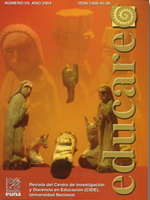Experiencia pedagógica creativa: expresión corporal, educación musical y currículo escolar y preescolar
DOI:
https://doi.org/10.15359/ree.2004-7.14Abstract
Creativity is an crucial tool in the development of a man's and a woman's personality. It frees themselves from fear of making mistakes and promotes the acceptance for new goals or experiences, invites them to explore and be respectful and tolerant, encourages individual and group work, arousing originality in their responses to the different conflicts they may have to face. In addition, it indicates the creating potential within each person, which should be respected but also stimulated, without limiting the individual's spontaneity. Such ideas are present in the “Workshop of Body Expression and Music for the Teachers of the First Cycle of Basic General Education”, which was given in different educational centers of the provinces of Cartago and San José. When encouraging creativity through strategies of body expression and musical education integrated to the school curriculum, a “motivation chain” towards their students is created, so they can also develop their creative capacity to enable significant learning.
References
Arguedas, C. Cordero O. Molinari O. (1987). La improvisación musical
hacia una educación creativa. Ponencia. Costa Rica: Escuela de Música. Universidad
Nacional.
Arguedas, C. (2004). La expresión musical y el currículo escolar. Revista Educación Universidad de Costa Rica, Volumen 28, N
º 1, 111-122.
Arguedas, C. (2004 ).La expresión corporal y la transversalidad como un eje construido a partir de la expresión artística. Revista Educación Universidad de Costa Rica, Volumen 28, Nº 1, 115-116.
Creatividad/ Improvisación. (1997). Eufonía 8. Didáctica de la Música.
Número 8. Año III. Julio.
Cuerpo y creatividad. (2001). Tándem 3. Didáctica de la Educación Física. España: Número 3. GRAÓ. Año II, abril.
Guilford, J.P. et al.(1983). Creatividad y educación. Barcelona: Paidós.
Marín, R. (1974). La creatividad en la educación. Cuadernos pedagógicos 29. Buenos Aires: Kapelusz.
Pascual, P. (2002). Didáctica de la música. Madrid: Pearson Educación.
Ruiz, N. C.(2002). Expresión y creatividad. Colombia: Biblioteca del educador PROLIBROS.
Stokoe, P. (1990). Expresión corporal. Arte, salud y educación. Buenos
Aires: Humanitas.
Vargas A. I.(1986). Técnicas para el desarrollo de la expresión y el movimiento en la Escuela Primaria o Básica. Guía de estudio del Módulo. La creatividad en los Talleres Integrales de Expresión Creadora . Unidad 7 .1 Oficina subregional de Educación de la UNESCO para Centroamérica y Panamá.
Downloads
Published
How to Cite
Issue
Section
License
1. In case the submitted paper is accepted for publication, the author(s) FREELY, COSTLESS, EXCLUSIVELY AND FOR AN INDEFINITE TERM transfer copyrights and patrimonial rights to Universidad Nacional (UNA, Costa Rica). For more details check the Originality Statement and Copyright Transfer Agreement
2. REUTILIZATION RIGHTS: UNA authorizes authors to use, for any purpose (among them selfarchiving or autoarchiving) and to publish in the Internet in any electronic site, the paper´'s final version, both approved and published (post print), as long as it is done with a non commercial purpose, does not generate derivates without previous consentment and recognizes both publisher's name and authorship.
3. The submission and possible publication of the paper in the Educare Electronic Journal is ruled by the Journal’s editorial policies, the institutional rules of Universidad Nacional and the laws of the Republic of Costa Rica. Additionally, any possible difference of opinion or future dispute shall be settled in accordance with the mechanisms of Alternative Dispute Resolution and the Costa Rican Jurisdiction.
4. In all cases, it is understood that the opinions issued are those of the authors and do not necessarily reflect the position and opinion of Educare, CIDE or Universidad Nacional, Costa Rica. It is also understood that, in the exercise of academic freedom, the authors have carried out a rogorous scientific-academic process of research, reflection and argumentation thar lays within the thematic scope of interest of the Journal.
5. The papers published by Educare Electronic Journal use a Creative Commons License:














 The articles published by Educare Electronic Journal can be shared with a Creative Commons License:
The articles published by Educare Electronic Journal can be shared with a Creative Commons License: 



